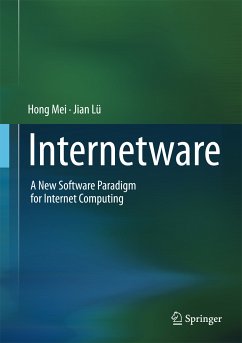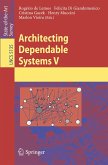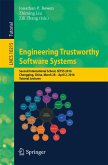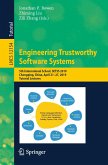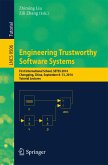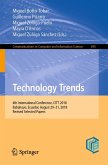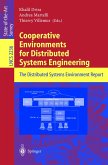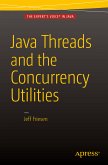

Alle Infos zum eBook verschenken

- Format: PDF
- Merkliste
- Auf die Merkliste
- Bewerten Bewerten
- Teilen
- Produkt teilen
- Produkterinnerung
- Produkterinnerung

Hier können Sie sich einloggen

Bitte loggen Sie sich zunächst in Ihr Kundenkonto ein oder registrieren Sie sich bei bücher.de, um das eBook-Abo tolino select nutzen zu können.
This book presents a comprehensive introduction to Internetware, covering aspects ranging from the fundamental principles and engineering methodologies to operational platforms, quality measurements and assurance and future directions. It also includes guidelines and numerous representative real-world case studies that serve as an invaluable reference resource for software engineers involved in the development of Internetware applications. Providing a detailed analysis of current trends in modern software engineering in the Internet, it offers an essential blueprint and an important…mehr
- Geräte: PC
- ohne Kopierschutz
- eBook Hilfe
- Größe: 23.5MB
![Architecting Dependable Systems V (eBook, PDF) Architecting Dependable Systems V (eBook, PDF)]() Architecting Dependable Systems V (eBook, PDF)40,95 €
Architecting Dependable Systems V (eBook, PDF)40,95 €![Engineering Trustworthy Software Systems (eBook, PDF) Engineering Trustworthy Software Systems (eBook, PDF)]() Engineering Trustworthy Software Systems (eBook, PDF)40,95 €
Engineering Trustworthy Software Systems (eBook, PDF)40,95 €![Engineering Trustworthy Software Systems (eBook, PDF) Engineering Trustworthy Software Systems (eBook, PDF)]() Engineering Trustworthy Software Systems (eBook, PDF)40,95 €
Engineering Trustworthy Software Systems (eBook, PDF)40,95 €![Engineering Trustworthy Software Systems (eBook, PDF) Engineering Trustworthy Software Systems (eBook, PDF)]() Engineering Trustworthy Software Systems (eBook, PDF)40,95 €
Engineering Trustworthy Software Systems (eBook, PDF)40,95 €![Technology Trends (eBook, PDF) Technology Trends (eBook, PDF)]() Technology Trends (eBook, PDF)73,95 €
Technology Trends (eBook, PDF)73,95 €![Cooperative Environments for Distributed Systems Engineering (eBook, PDF) Cooperative Environments for Distributed Systems Engineering (eBook, PDF)]() Khalil DriraCooperative Environments for Distributed Systems Engineering (eBook, PDF)40,95 €
Khalil DriraCooperative Environments for Distributed Systems Engineering (eBook, PDF)40,95 €![Java Threads and the Concurrency Utilities (eBook, PDF) Java Threads and the Concurrency Utilities (eBook, PDF)]() Jeff FriesenJava Threads and the Concurrency Utilities (eBook, PDF)35,95 €
Jeff FriesenJava Threads and the Concurrency Utilities (eBook, PDF)35,95 €-
-
-
Dieser Download kann aus rechtlichen Gründen nur mit Rechnungsadresse in A, B, BG, CY, CZ, D, DK, EW, E, FIN, F, GR, HR, H, IRL, I, LT, L, LR, M, NL, PL, P, R, S, SLO, SK ausgeliefert werden.
- Produktdetails
- Verlag: Springer Nature Singapore
- Seitenzahl: 442
- Erscheinungstermin: 1. Dezember 2016
- Englisch
- ISBN-13: 9789811025464
- Artikelnr.: 53152951
- Verlag: Springer Nature Singapore
- Seitenzahl: 442
- Erscheinungstermin: 1. Dezember 2016
- Englisch
- ISBN-13: 9789811025464
- Artikelnr.: 53152951
- Herstellerkennzeichnung Die Herstellerinformationen sind derzeit nicht verfügbar.
